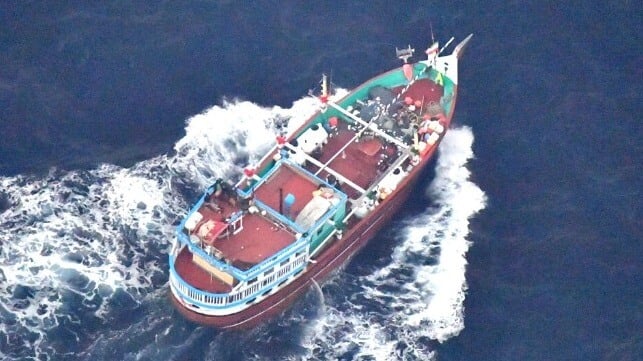Re-Imagining Africa’s Agency in Global Maritime Security

Over the past month, the global maritime community has woken up to the possible re-emergence of Somali piracy, following the capture of the fishing vessel Almeraj 1 off the coast of Somalia. While security agencies are still investigating the matter, some parts of the western Indian Ocean and the Gulf of Aden have recently seen a rise in the number of security incidents affecting merchant shipping.
Owing to the checkered history of maritime security along the East African coastline, these events should be concerning. The ongoing Israel-Hamas war has created suitable conditions for militant groups in the southern Red Sea and Gulf of Aden to threaten commercial shipping.
Regional stakeholders seek a long-term solution to the persistent maritime security challenges along parts of the African coastline. This was the crux of a ministerial conference organized last month by the Republic of Mauritius, in partnership with the Indian Ocean Commission (IOC). To get a sense of the conference’s resolutions, TME African Correspondent Brian Gicheru spoke with Raj Mohabeer, the head of Maritime Security at the IOC.
The IOC has established the Regional Maritime Information Fusion Centre (RMIFC) in Madagascar and the Regional Centre for Operational Coordination (RCOC) in Seychelles. What role do these two centers play?
The two centers are progressing very well, slowly but surely, and it is important to note they are complementary and constitute jointly the executive arm of the Maritime Security Architecture (MSA) of the Western Indian Ocean.
For RMIFC, it provides a mechanism for information sharing and monitoring movement of vessels within the WIO region. The aim is to detect abnormal movements and provide enhanced maritime domain awareness for countries in the region. The analysis of the RMIFC may lead to the identification of what we call as “vessel of interest” (VOI), which then is notified to the other center, the Regional Centre for Operational Cooperation (RCOC) for inspection of the said ‘VOI’.
Essentially, the RCOC pulls together naval and other necessary security assets to promote maritime safety and security in the WIO. In other words, it provides a cooperation mechanism for regional naval missions for countries party and partner to two Maritime Security Agreements signed in 2018.
In terms of progress, the centers became fully operational in September last year, just after the Covid pandemic period. So far, the MSA has led to 18 operations. Vessels carrying nearly two tons of drugs were intercepted. On other occasions we found vessels engaging in IUU and endangered species fishing, illegal migration, and have also conducted search and rescue missions. In addition, RMIFC and RCOC are in close collaboration with other partners, such as the Operation EUNAVFOR-Atalanta and the British naval forces.
There are numerous actors involved with maritime security in Western Indian Ocean. Are there synergies between these stakeholders, or does it lead to overlapping of duties?
Recently, the 21 signatory states of the IMO-led Djibouti Code of Conduct/Jeddah Agreement (DCoC/JA) have agreed to use the RMIFC and RCOC as their regional centers. This is excellent as it will avoid duplication of efforts and overlapping, while at the same time significantly improving the regional maritime capability. It will also help to create coherence between the existing maritime security mechanisms.
There is a dialogue to also link up the Contact Group on Illicit Maritime Activities (CGIMA, formerly the Contact Group on Piracy off the Coast of Somalia, CGPCS) to ensure coherency and complementarity.
The upcoming launch of the new Safe Seas Africa Programme funded by the EU includes a component which will be implemented by the IOC. This will ensure continuity of the operationalization of the MASE Security Architecture of the Western Indian Ocean, while facilitating the interconnection of existing maritime security architectures – hopefully from the Gulf of Guinea, through the Western Indian Ocean to the Western Pacific.
At the conference, the idea of the African Coast Guard Functions Forum was endorsed. Tell us more.
Initially, this idea came from Moroni Declaration signed back in June, which was part of the ,inisterial conference on Blue Economy organized under the aegis of the Comorian Chairmanship of the African Union (AU).

that matters most
Get the latest maritime news delivered to your inbox daily.
Ideally, the African Coastguard Functions Forum is meant to bring together African coastguards for purposes of regional collaboration and building trust among neighboring institutions having several functions in common. You find that neighboring coastal states do not have any cooperation whatsoever in addressing maritime security threats. Most countries do not have sufficient assets in their maritime domains, and a Coastguard Functions Forum would come in handy.
The Italian Coast Guard, as the chair of the Mediterranean Coast Guard Functions Forum, has already pledged to offer technical assistance needed for establishment of the African Coast Guard Forum. Kenya has also proposed to host the first African Coast Guard Functions Forum next year.
